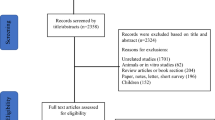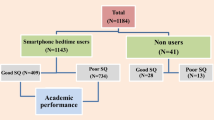Abstract
Background and Aims
It remains unknown whether ambulation or sleep predicts postoperative length of stay for patients with IBD. We aim to identify the utility of wearable biosensors in predicting postoperative length of stay for patients with IBD.
Methods
Associations of postoperative length of stay with step count/sleep duration/sleep efficiency measured by wearable biosensors were examined. The best-fitting multivariable linear regression model predicting length of stay was constructed using stepwise model selection.
Results
Final sample included 37 patients. Shorter sleep duration on postoperative day 4 (r = 0.51, p = 0.043) or 5 (r = 0.81, p = 0.0045) or higher sleep efficiency on postoperative day 5 (r = − 0.77, p = 0.0098) was associated with a shorter length of stay. Additionally, a more positive change in sleep efficiency from postoperative day 4–5 was associated with a shorter length of stay (r = − 0.77, p = 0.024). The best-fitting multivariable linear regression model revealed Clavien–Dindo grade 1 (p = 0.045) and interaction between Clavien–Dindo grade 2/3a and mean daily steps (p = 0.00038) are significant predictors of length of stay. The following variables were not significantly associated with length of stay: mean daily steps/sleep duration/sleep efficiency, average rate of change in these three variables, and changes in step count between successive postoperative days 1–5, sleep duration between successive postoperative days 2–5, and sleep efficiency between successive postoperative days 2–4.
Conclusion
We demonstrated the utility of activity and sleep data from wearable biosensors in predicting length of stay. Patients with more severe complications may benefit more (i.e., reduced postoperative length of stay) from increased ambulation. However, overall, sleep duration/efficiency did not predict length of stay.



Similar content being viewed by others
References
Lichtenstein GR, Loftus EV, Isaacs KL, et al. ACG clinical guideline: management of Crohnʼs disease in adults. Am J Gastroenterol. 2018;113:481–517.
Rubin D, Ananthakrishnan A, Siegel C, et al. ACG clinical guideline: ulcerative colitis in adults. Am J Gastroenterol. 2019;114:384–413.
Xu J, Tang M, Shen J. Trends and factors affecting hospitalization costs in patients with inflammatory bowel disease: a two-center study over the past decade. Gastroenterol Res Pract. 2013;2013:1–12.
Xu F, Liu Y, Wheaton AG, et al. Trends and factors associated with hospitalization costs for inflammatory bowel disease in the United States. Appl Health Econ Health Policy. 2019;17:77–91.
Gustafsson UO, Scott MJ, Hubner M, et al. Guidelines for perioperative care in elective colorectal surgery: Enhanced Recovery After Surgery (ERAS®) Society recommendations: 2018. World J Surg. 2019;43:659–695.
Brower R. Consequences of bed rest. Crit Care Med. 2009. https://doi.org/10.1097/CCM.0b013e3181b6e30a.
Stewart NH, Arora VM. Sleep in hospitalized older adults. Sleep Med Clin. 2018;13:127–135.
Case MA, Burwick HA, Volpp KG, et al. Accuracy of smartphone applications and wearable devices for tracking physical activity data. JAMA. 2015;313:625–626.
de Zambotti M, Goldstone A, Claudatos S, et al. A validation study of Fitbit Charge 2TM compared with polysomnography in adults. Chronobiol Int. 2018;35:465–476.
van Langenberg DR, Papandony MC, Gibson PR. Sleep and physical activity measured by accelerometry in Crohn’s disease. Aliment Pharmacol Ther. 2015;41:991–1004.
White EC, Melmed GY, Vasiliauskas E, et al. Does preoperative immunosuppression influence unplanned hospital readmission after surgery in patients with Crohn’s disease? Dis Colon Rectum. 2012;55:563–568.
World Health Organization. Haemoglobin concentrations for the diagnosis of anaemia and assessment of severity. https://www.who.int/vmnis/indicators/haemoglobin.pdf; 2011. Accessed 22 October 2020.
Truong A, Hanna MH, Moghadamyeghaneh Z, et al. Implications of preoperative hypoalbuminemia in colorectal surgery. World J Gastrointest Surg. 2016;8:353–362.
Dindo D, Demartines N, Clavien P-A. Classification of surgical complications. Ann Surg. 2004;240:205–213.
Venables WN, Ripley BD. Modern Applied Statistics with S. Berlin: Springer; 2002.
Andersen J, Kehlet H. Fast track open ileo-colic resections for Crohn’s disease. Colorectal Disease. 2005;7:394–397.
Daskivich TJ, Houman J, Lopez M, et al. Association of wearable activity monitors with assessment of daily ambulation and length of stay among patients undergoing major surgery. JAMA Netw Open. 2019;2:e187673–e187673.
Browning L, Denehy L, Scholes RL. The quantity of early upright mobilisation performed following upper abdominal surgery is low: an observational study. Aust J Physiother. 2007;53:47–52.
Fiore JF, Castelino T, Pecorelli N, et al. Ensuring early mobilization within an enhanced recovery program for colorectal surgery: a randomized controlled trial. Ann Surg. 2017;266:223–231.
Castelino T, Fiore JF, Niculiseanu P, et al. The effect of early mobilization protocols on postoperative outcomes following abdominal and thoracic surgery: a systematic review. Surgery. 2016;159:991–1003.
Dobing S, Frolova N, McAlister F, et al. Sleep quality and factors influencing self-reported sleep duration and quality in the general internal medicine inpatient population. PLoS One. 2016. https://doi.org/10.1371/journal.pone.0156735.
Funding
This research was supported by the University of Chicago Pritzker School of Medicine and an investigator-initiated grant from Takeda Pharmaceuticals.
Author information
Authors and Affiliations
Contributions
YY, PHS, NHH, and DTR conceived and designed the study. YY, PHS, AIE, KBS, VR, JS, and KEJ contributed to the acquisition of data. YY, PHS, and AIE contributed to the analysis of data. All authors contributed to interpretation of data and were involved in drafting the article or revising it critically for important intellectual content. All authors approved the final manuscript to be submitted and agreed to be accountable for all aspects of the work.
Corresponding author
Ethics declarations
Conflict of interest
YY, PHS, AIE, KBS, VR, JS, KEJ, and NHH have no relevant disclosures. DTR is a consultant and has received grant support from Abbvie, Merck & Co., Janssen, Takeda, and Pfizer.
Ethical approval
The study was approved by the University of Chicago Institutional Review Board (IRB15-1535).
Informed consent
Informed consent was obtained from all individual participants included in the study.
Additional information
Publisher's Note
Springer Nature remains neutral with regard to jurisdictional claims in published maps and institutional affiliations.
Podium presentation at Advances in Inflammatory Bowel Diseases (AIBD), Orlando, Florida; December 12–14, 2019.
Rights and permissions
About this article
Cite this article
Yi, Y., Sossenheimer, P.H., Erondu, A.I. et al. Using Wearable Biosensors to Predict Length of Stay for Patients with IBD After Bowel Surgery. Dig Dis Sci 67, 844–853 (2022). https://doi.org/10.1007/s10620-021-06910-w
Received:
Accepted:
Published:
Issue Date:
DOI: https://doi.org/10.1007/s10620-021-06910-w




